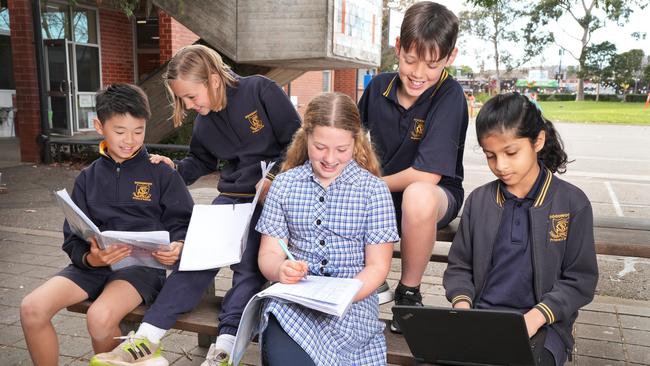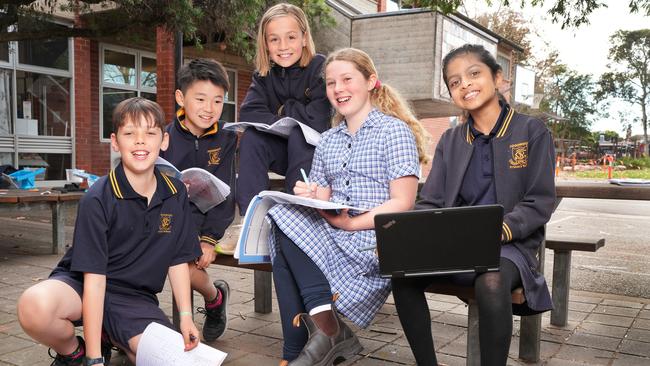NAPLAN results 2024: How South Australian students compare to interstate peers
The 2024 NAPLAN results have been released. See where South Australia’s rankings are going backwards compared to students around the country.
Education
Don't miss out on the headlines from Education. Followed categories will be added to My News.
South Australian students’ reading skills have gone backwards in a surprise finding from the latest NAPLAN test results.
Basic grammar, such as using commas and capital letters properly, continues to trip students up but their writing proficiency has improved.
Data released on Wednesday shows SA rose in the national literacy and numeracy test rankings, relative to the other states, in just one category this year – Year 3 writing.
Compared to NSW, WA, Victoria, Queensland and Tasmania, SA’s average score dropped for years 5 and 9 reading and Year 9 numeracy.
When comparing the average score achieved by SA students this year with the 2023 cohort, there was a decline in reading across all year levels.
The findings have come as a surprise because last year’s reading results had been strong.
That success had been attributed to a focus on teaching phonics, which helps children learn the connection between written letters and how they sound so they can decode, or “sound out”, new words.

Education Minister Blair Boyer said the decline in reading results, particularly for Year 5 students, was something the state government is “watching closely”.
“It’s a surprising result given that cohort’s previous results in this area,” Mr Boyer said.
“I’ve tasked the (Education) Department with some further work on whether there’s additional support we need to put in place.”
However, Mr Boyer said “dips and gains occur across every year”.
“What we’re looking for is a long term improvement trajectory, which is what we’ve seen in literacy, following the introduction of phonics,” he said.

Engagement in Year 9, particularly among boys, continues to be a national issue, Mr Boyer said, which he hoped to address with a focus on “bolstering our career education”.
“As young people enter their final years of high school, they can still see exciting opportunities for themselves and remain engaged in education,” he said.
“Engagement and wellbeing in school is a big indicator of academic performance.
“It always has been and always will be.”
Opposition education spokesman John Gardner said the lack of progress “should ring alarm bells” for the government.
“It’s good they’ve kept phonics but other basic skills and academic outcomes need to remain central to our schools’ work, or else we risk falling behind,” Mr Gardner said.
“We have been making good progress in the last six years and now is not the time to drop the ball.”
Students took the NAPLAN tests in March.
The Australian Curriculum, Assessment and Reporting Authority (ACARA) released results on Wednesday showing how students in each state and territory fared.
The data is also broken down by student gender, indigenous background and metropolitan or regional location.
Individual school results will be released later in the year.
RANKED: HOW EVERY SA SCHOOL PERFORMED IN 2023
A major shake-up last year changed how results were reported, shifting from the previous system of 10 bands to four new categories.
They group students who need additional support, are still developing, have a strong grasp or are exceeding expectations.
ONE in five Year 9 boys need extra help with grammar, and results have worsened since last year.
GIRLS are also struggling with grammar and almost 15 per cent of Year 3s need extra help.
ONE in four girls exceeded expectations in Year 9 writing (up from 20.5 per cent), and one in five excelled in Year 7 writing (up from 15 per cent).
THE best results for boys were in spelling where 18.3 per cent of Year 7s and 14 per cent of Year 3s exceeded expectations.
However, average spelling scores for SA students were lower this year, compared to 2023, in years 3, 5 and 9.
Average scores for SA students fell in 10 out of the 20 categories across all year levels including Year 5 reading, which dropped about eight points (from 489 to 481.1).
The Year 7 writing score had the largest increase, gaining about nine points (522.3 to 531.1).
All tests are conducted online and adapt to offer students different questions depending on how they are answering.
ACARA says students use a closed system which prevents them from using artificial intelligence or spell checking functions.
There were, however, 13 security breaches reported and another 42 “general” breaches across the country – on par with previous years.




